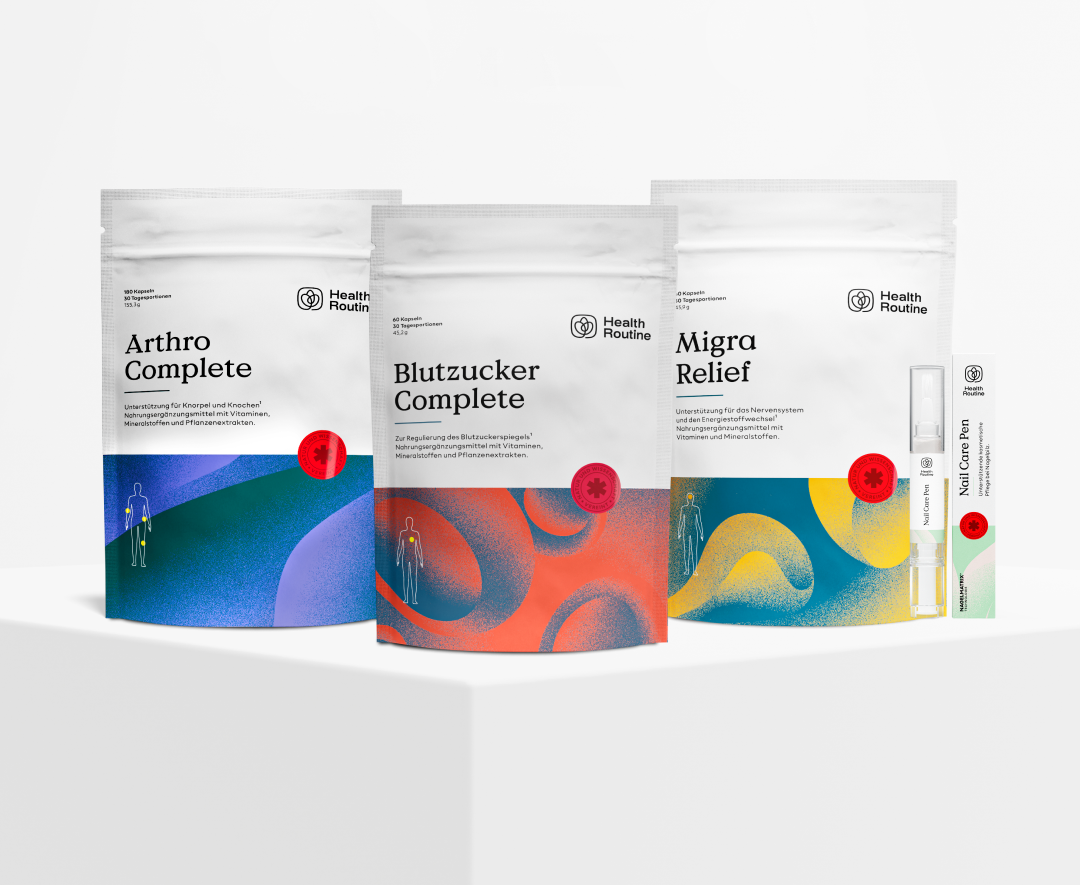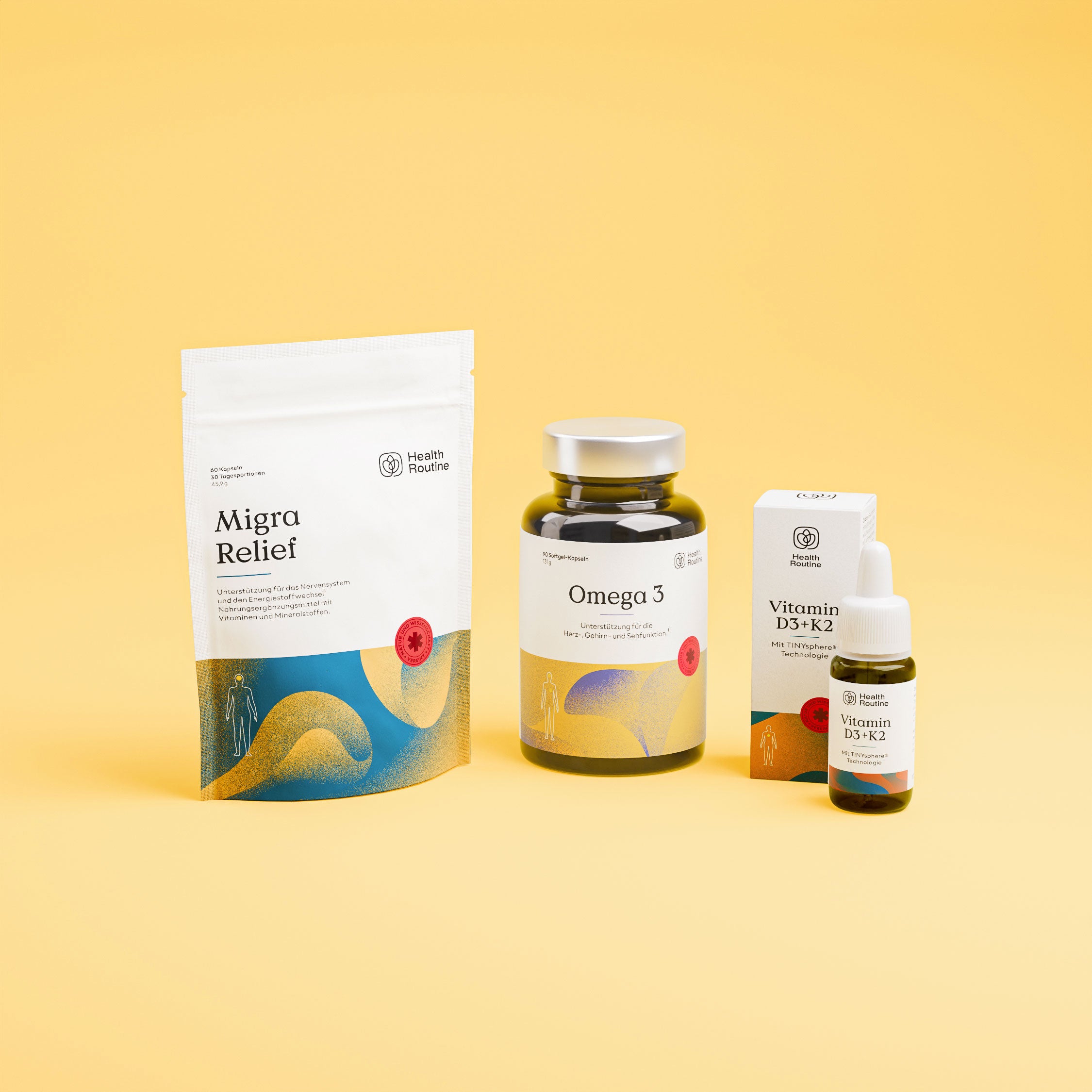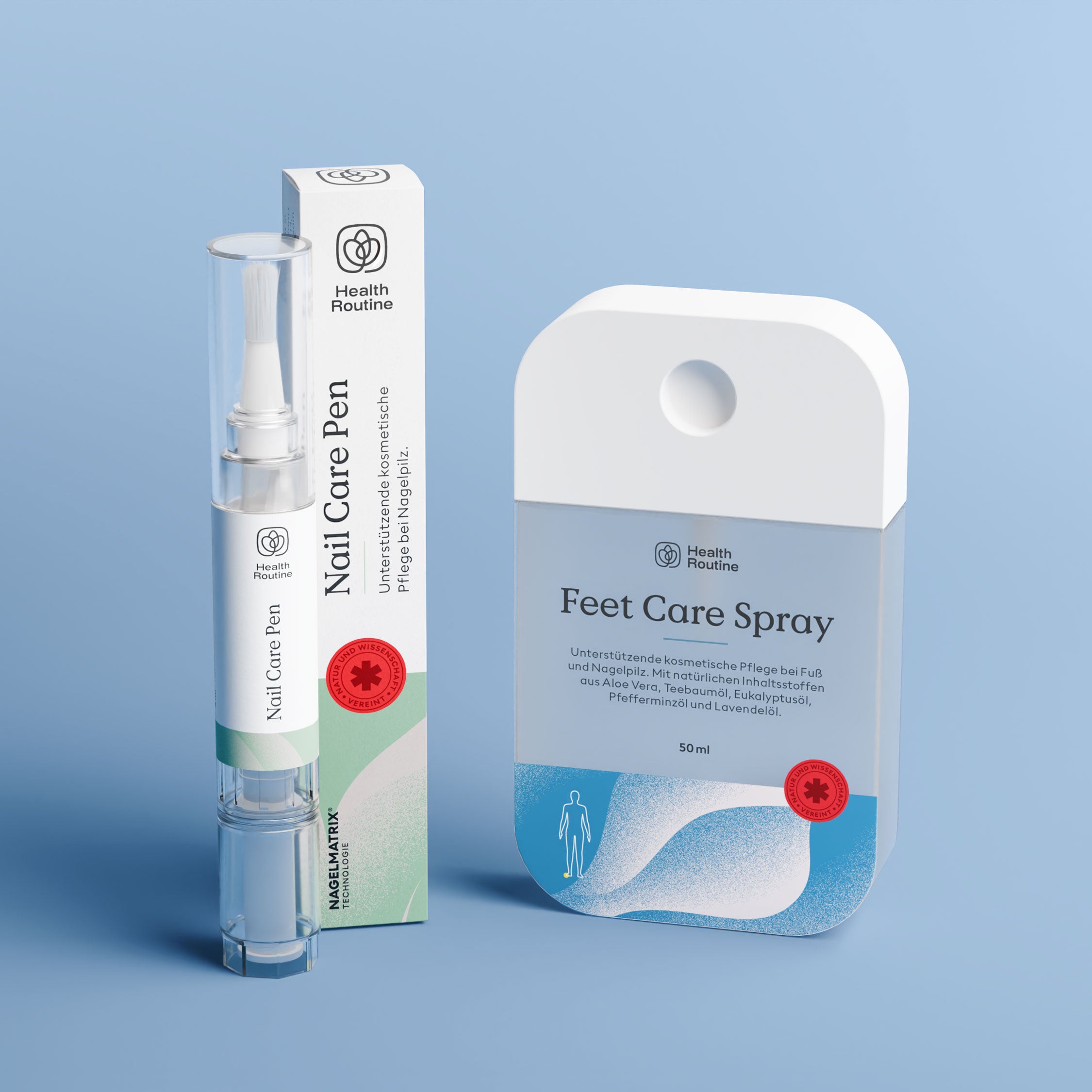Migraines can significantly impact daily life. The good news is that certain foods known to trigger migraines can be avoided.
This guide can help you identify the foods you should avoid and give you tips on how to adjust your diet to best reduce your migraine attacks .
The most important things at a glance
-
Find out which foods are considered possible triggers of migraines in sensitive people – and how you can consciously plan your diet.
-
Discover helpful everyday strategies that help you better coordinate your diet, rhythm, and stress reduction.
-
Get tips on how to structure your personal migraine routine through mindful nutrition, trigger observation, and complementary care products.
What exactly is migraine?
Migraine is a neurological disorder characterized by intense and throbbing headaches that can occur on one or both sides of the head.
Migraine affects about one billion people worldwide and differs from normal headaches in its intensity and accompanying symptoms such as nausea , vomiting and sensitivity to light
Want to learn more about migraines? Download our free e-book now.
What role does diet play in migraines?
Diet plays a crucial role in the prevention and treatment of migraines. Some foods can trigger migraine attacks, while others can help prevent them.
Therefore, it is important to know what to eat when you have a migraine and which foods to avoid when you have a migraine.
Diet for migraine with aura can also special requirements There are also certain foods and herbs for migraines that can be incorporated into your daily diet.
Breakfast should also be chosen carefully in case of migraine in order to start the day with a balanced meal that supports the body and prevents migraine attacks.
If you are interested in further information and tips on migraines, click here for our free migraine e-book:
Ketogenic diet for migraines
A ketogenic diet is not recommended for migraines, as this type of diet only provides a very small amount of carbohydrates consumed However, carbohydrates are essential to prevent migraine attacks.
Affected react hypersensitive to Fluctuations in blood sugar levels . This is precisely why sugar often causes headaches because it causes blood sugar levels to rise rapidly.
Stabilize complex carbohydrates blood sugar levels, which can prevent migraine attacks. Furthermore, the brain derives its energy exclusively from carbohydrates, and a deficiency can generally lead to headaches and, consequently, migraine attacks.
Therefore, other low-carb diets, such as the Atkins diet, are not recommended.
Diet for migraine with aura
At the Migraine with aura In addition to the agonizing headaches, those affected often suffer
- under Visual and speech disorders
- and one distorted perception .
This type of migraine is usually genetic and the triggers of the attacks are very individual.
However, certain foods can also be responsible for this. Therefore, if you have migraine with aura, it is worth
- healthy,
- to pay attention to regular nutrition
- and keep a migraine diary.
This allows the trigger foods to be identified.
Eating regularly can prevent migraines
Headaches are often caused by undereating. Furthermore, if you haven't eaten enough, headaches are often even more unbearable than they already are. Regular, mindful eating can have a positive effect on migraines.
Pay particular attention to the following things:
✔ Set specific meal times and try to stick to them as best as possible.
✔ Do not skip meals
✔ Eat calmly and consciously, do not rush
✔ Drink enough water every day
✔ Avoid ready-made products with flavor enhancers and preservatives
✔ Choose the freshest food possible

The right diet for migraines
Unfortunately, it is not possible , migraine attacks to actively combat headaches with food . Therefore, the question of what to eat when you have a headache is not helpful.
Instead, you should ask yourself which foods you should consume to potentially prevent the occurrence of headaches.
One healthy eating is crucial for migraines, and some foods are particularly recommended:
✔ Sourdough bread and yeast-free baked goods
✔ Oat flakes
✔ Whole grain products (brown rice, whole wheat pasta, etc.)
✔ Fresh fruit
✔ Fresh vegetables (broccoli, green salad, cabbage, leeks, carrots, etc.)
✔ Chia, sesame and flax seeds
✔ Pumpkin, pine and sunflower seeds
✔ Macadamia nuts, almonds, coconut and chestnuts
✔ Butter and oils (linseed, olive, hemp, walnut and rapeseed oil)
✔ Plenty of water and unsweetened herbal teas
✔ Fresh fish and fresh meat
✔ Herbs and spices
✔ Apple cider vinegar
✔ Egg yolk
✔ Unsweetened dairy products if possible
✔ Cream cheese, mozzarella, ricotta, mascarpone, butter cheese and young Gouda
Try incorporating these foods into your diet to help prevent migraine attacks. It's also important to actively address any nutrient deficiencies, as these can contribute to migraine attacks.
Nutritional supplements such as Migra Relief from Health Routine can help you with this. It has also been found that a diet rich in omega-3 can have positive effects on migraines.
Also the Omega 3 from Health Routine can be a good option for people who suffer from migraines.
Foods that can trigger migraines
In addition to regular and mindful eating, avoiding certain foods can be helpful for migraines. First, try eliminating one of the following foods and see if your migraines improve.
If not, this food may not be a trigger for you. Pay special attention to these potentially migraine-inducing foods:
- white bread
- Products with a lot of sugar or artificial sweeteners (chocolate, ice cream, sweet baked goods, etc.)
- French fries and fried potatoes
- Durum wheat pasta and husked rice
- Overripe fruit, dried fruit and canned fruit
- Eggplants, pulses, mushrooms, spinach, tomatoes, sprouts and pickled vegetables
- Walnuts, peanuts and pistachios
- safflower oil
- Black and green tea, sweet drinks, coffee and alcohol
- Canned fish, raw sausages, liver and cured, marinated or dried meat
- Ketchup, tomato paste, balsamic vinegar, wine vinegar and soy products
- Ready meals
- Tyramine-containing cheese and fruit yogurt/fruit curd
The list may seem overwhelming at first, but don't worry—a special diet for migraines can be helpful, but it doesn't mean you have to avoid all of these foods forever to avoid migraine attacks.
Try your to identify personal triggers and pay attention to the amount and frequency with which you consume each food.
Typical causes of migraines
Migraines can be triggered by a variety of factors, including
- Stress,
- hormonal changes,
- certain foods and beverages
- and environmental factors.
Stress as a cause of migraines
Stress is the most common trigger of migraine attacks. Changes in sleep patterns or daily routines can cause stress and thus trigger migraine attacks.
Expert tip: Everyday situations such as upcoming exams, excessive demands at work, or relationship problems often cause stress. Therefore, stress and, consequently, migraines often have psychological causes.
Overwork as a cause of migraines
Physical exertion can also trigger migraine attacks. This explains why some people experience migraines after exercise. High levels of physical exertion from exercise or other physical activities at work or in everyday life place a strain on your body.
Although exercise and physical activity are generally good for you, your body requires a lot of energy during these phases. This can lead to an energy deficit in the brain and thus trigger migraine attacks. So be careful not to overtax your body.
Hormonal causes of migraines
Hormones can also be a cause of migraines. Hormonal changes during
- puberty,
- menstruation
- and menopause lead to or intensify migraine attacks in many women.
The falling estrogen levels before menstruation may be responsible for the severe headaches.
Migraine attacks may occur more frequently after pregnancy . Estrogen levels are elevated during pregnancy, making headaches less frequent or even preventing them.
However , after birth , estrogen levels drop abruptly, which promotes migraines.
During menopause , estrogen levels also drop, and hormones generally become disrupted. It's even possible for women to experience migraines for the first time during menopause, even though they've never had them before.

External influences as a cause of migraines
Severe headaches can also be triggered by external factors. Changes in the weather are a trigger for many sufferers.
People who are sensitive to the weather often notice sudden changes in temperature or air pressure early on, as they are accompanied by a migraine attack.
Light can also trigger seizures. Bright light, such as that from screens, bright lamps, or direct sunlight, is often a trigger.
Certain lighting effects and light-dark contrasts can also cause migraines. This is because exposure to light can lead to sensory overload.
Noise can also cause sensory overload and trigger migraines. This includes loud music , construction noise , traffic , and noise from electronic devices such as televisions and smartphones.
In addition, those affected are often not only sensitive to weather, light and noise, but also to smells.

Some smells can trigger or worsen migraines:
-
Cigarette smoke: The chemicals in cigarette smoke can constrict blood vessels in the brain, triggering migraine attacks.
-
Fragrances (perfumes, deodorants, air fresheners, air fresheners, etc.): Sweet smells in particular are often perceived as disturbing and trigger severe headaches.
-
Food smells: The smell of fried foods, chocolate, or citrus fruits in particular can trigger migraine attacks in some people.
-
Alcohol and caffeine: Red wine and drinks with high caffeine content can trigger migraine attacks in some people.
- Food additives: Certain food additives, such as monosodium glutamate (MSG) or nitrates and nitrites found in processed meat, can trigger migraine attacks.
What helps against migraines?
There are several methods to relieve or prevent migraine attacks. Here are some tips that may help you better manage your migraines .
✔ Peace & Darkness: Lie down in a quiet, dark room and try to relax. Light, noise, and strong smells can worsen migraine symptoms, so avoid them.
✔ Cooling: A cold compress or a cold cloth on the forehead or back of the head can help relieve pain. Contrast showers or a cold foot bath can also relieve your pain by stimulating circulation.
✔ Massage & Acupressure: A gentle massage of the neck and head can help relieve tension and pain.
✔ A foot reflexology massage can also improve circulation and energy flow in your body. Additionally, the acupressure point between your thumb and index finger can provide relief.
✔ Hydration: Drink plenty of fluids to avoid dehydration, especially if you're vomiting. Water is certainly the best choice, but tea (chamomile or peppermint) is also good.
✔ Ginger: Ginger has anti-inflammatory properties and can help with nausea. Depending on your preference, you can take it in various forms, such as flavorless capsules, fresh ginger, or infused with hot water.
✔ Peppermint oil: Peppermint oil has a calming effect on the stomach and can help with nausea. Apply the oil to your temples and neck, or simply inhale the refreshing scent.
Caution: Do not accidentally wipe the oil into your eyes! Therefore, always wash your hands thoroughly after application and always avoid contact of the oil with your eyes and mucous membranes.
✔ Painkillers: Before taking any painkillers, you should always consult your doctor first. In addition to conventional painkillers, there are also special medications for migraines called triptans.
They can help prevent the dilation of blood vessels in the brain. Your doctor will be happy to help and explain possible risks and side effects.
Preventing migraines: How it works
So far, we've focused exclusively on the question: What helps immediately against migraines? But it would be even better if migraines were prevented from occurring in the first place, or if they occurred less frequently.
Wouldn't it be a great relief and an enrichment to your quality of life if migraine attacks could be reduced or their intensity lessened? We'll show you what can help prevent migraines:
1. Conscious daily routine: Some lifestyle changes can help alleviate or prevent migraine symptoms. These include
- regular exercise,
- sufficient sleep,
- Stress reduction
- and a healthy diet.
Expert advice: If your body is in a good balance between stress and tension and you also have calming health routines, this will increase your overall well-being and can prevent migraine attacks.
2. Relaxation techniques: When asked "What helps against migraines?" this is certainly the top answer – and it's true. Relaxation techniques such as
- Yoga,
- meditation
- or progressive muscle relaxation can help reduce stress and thus also relieve migraine symptoms.
3. Know and avoid triggers: For some people, migraines are triggered by certain triggers, such as certain foods. These often include
- Red wine,
- Chocolate
- or cheese, all of which contain so-called biogenic amines.
It is therefore suspected that these chemical compounds may trigger migraines in some people. Avoiding these triggers can reduce the frequency and severity of migraine attacks.

4. Optimize vitamin and mineral balance: Your body needs
- nutrients,
- minerals,
- Vitamins and much more in certain quantities to function smoothly.
Vitamins and other supplements can help you feel fitter overall and be more resilient. Unfortunately, adequate intake cannot always be achieved through diet.
5. Migra Relief by Health Routine: A good starting point for effective migraine prevention, which is also good for the body overall, could be the intake of
- Magnesium,
- Vitamin C
- and coenzyme Q10, e.g. in the form of a dietary supplement such as Migra Relief .
The effect does not develop immediately, but builds up sustainably in your body over several weeks.
Expert tip: A pain diary can help you identify triggers and, at the same time, identify what works for you. This also provides a personal answer to the question of what really helps you combat migraines.
Conclusion
Migraine is more than just a headache; it's a complex neurological condition that can significantly impact daily life. While there's no one-size-fits-all solution, a mindful lifestyle that includes regular exercise, stress reduction, adequate sleep, and a balanced diet can help reduce the frequency and intensity of migraine attacks.
Supplements such as Omega 3 and Migra Relief can also play an important role in this "health routine." Remember that you are not alone, and there are many resources and strategies available to help you live a fulfilling life despite migraines.
Together at Health Routine, we want to improve your quality of life and help you better manage your migraines. Your health is worth it, and we're here to support you.
FAQ
Is there a special migraine diet?
There's no specific "migraine diet," but certain foods are known to trigger migraine attacks. It's important to identify and avoid these trigger foods .
A balanced diet rich in fresh fruits and vegetables, whole grains, and lean protein can help prevent migraine attacks.
Does coffee help with migraines?
Coffee can have both positive and negative effects on migraines. Caffeine can relieve headaches in some people because it constricts blood vessels and blocks pain receptors. On the other hand, too much caffeine or sudden caffeine withdrawal can also trigger migraine attacks.
Can garlic trigger migraines?
There's no specific evidence that garlic triggers migraines. However, everyone reacts differently to certain foods, and what's good for one person may be a trigger for another.
It is advisable to keep a food diary to identify possible trigger foods.
🌿 Discover Health Routine products now:
Your medical advice
Our products are not intended to diagnose, treat, cure, or prevent any disease. The information provided in this article is for informational purposes only and is not intended as a substitute for advice from your physician or other healthcare professional.
Furthermore, our products are not a substitute for medications or other treatments prescribed by your doctor or healthcare provider. Regardless of the due care taken, no liability or warranty is assumed for the
- Accuracy,
- topicality,
- completeness
- and availability of the information provided.
No legal claims can be made for any damages potentially resulting from the use and application of this information. Liability claims of any kind are excluded.






